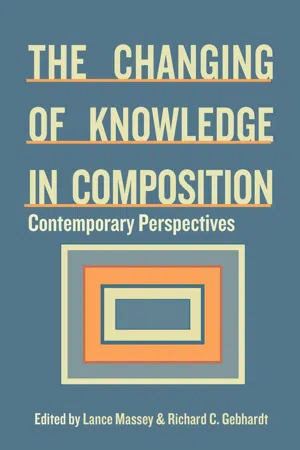
Changing of Knowledge in Composition
Contemporary Perspectives
- English
- PDF
- Available on iOS & Android
Changing of Knowledge in Composition
Contemporary Perspectives
About This Book
Lance Massey and Richard Gebhardt offer in this collection many signs that composition again faces a moment of precariousness, even as it did in the 1980s—the years of the great divorce from literary studies. The contours of writing in the university again are rapidly changing, making the objects of scholarship in composition again unstable. Composition is poised to move not from modern to postmodern but from process to postprocess, from a service-oriented "field" to a research-driven "discipline." Some would say we are already there. Momentum is building to replace "composition" and the pedagogical imperative long implied in that term with a "writing studies" model devoted to the study of composition as a fundamental tool of, and force within, all areas of human activity.
Appropriately, contributors here use Stephen M. North's 1987 book The Making of Knowledge in Composition to frame and background their discussion, as they look at both the present state of the field and its potential futures. As in North's volume, The Changing of Knowledge in Composition describes a body of research and pedagogy brimming with conflicting claims, methodologies, and politics, and with little consensus regarding the proper subjects and modes of inquiry.
The deep ambivalence within the field itself is evident in this collection. Contributors here envision composition both as retaining its commitment to broad-based, generalized writing instruction and as heading toward content-based vertical writing programs in departments and programs of writing studies. They both challenge and affirm composition's pedagogical heritage. And they sound both sanguine and pessimistic notes about composition's future.
Frequently asked questions
Information
Table of contents
- Contents
- Introduction: Making Knowledge in Composition Then, Now, and in the Future
- Notes on the Origins of The Making of Knowledge in Composition
- One: Personal Responses to The Making of Knowledge In Composition
- Two: Working the Field: Knowledge - Making Communities Since The Making of Knowledge in Composition
- Three: The Making of Knowledge in Composition and Education: Undergraduate, Graduate, and Beyond
- Four: Disciplinary Identities, Disciplinary Challenges: Unity, Multiplicity, and Fragmentation
- Afterword
- Index
- About the Authors